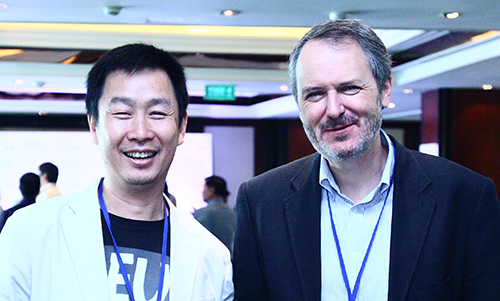In January, TREAT Asia embarked on a think tank project to identify and address gaps in the management of HIV in Asia. The project is bringing together over 20 experts in HIV and other sub-specialties from Australia, China and Hong Kong SAR, India, Indonesia, the Philippines, South Korea, Taiwan, Thailand, Cambodia, Japan, Malaysia, and Vietnam.
The think tanks are focusing on three priority areas: HIV and cardiovascular disease, HIV and liver disease, and HIV and drug resistance. The first of two scheduled meetings was chaired by Dr. Patrick Li of Queen Elizabeth Hospital in Hong Kong. Participants were divided into working groups to identify research, education, policy, and advocacy gaps in each area, and to develop key strategies to address them.

Dr. Man-Po Lee (left), TAHOD Chair and site Principal Investigator at Queen Elizabeth Hospital, Hong Kong SAR, with Dr. Matthew Law (right), Head Biostatistician of the Kirby Institute
The study group on HIV and cardiovascular disease was chaired by Dr. Matthew Law of The Kirby Institute in Sydney, Australia. The group identified an overall lack of studies on cardiovascular disease (CVD) risk in HIV patients in most Asian countries. Current global and national HIV treatment guidelines have yet to integrate CVD management, and the Asian countries’ national antiretroviral therapy (ART) guidelines do not generally mention how patients with HIV and CVD risk are to be assessed and managed. The group identified several strategies to improve clinical guidelines on caring for patients with HIV and CVD. The plan includes completing a literature review to compare CVD rates and risk factors in Asian and Caucasian populations, and a site survey to assess CVD screening, diagnosis, and management practices in HIV-positive versus -negative individuals. The group also discussed educational and training opportunities, such as promoting smoking cessation programs to be used by HIV providers.
Dr. Nicolas Durier, a consultant to TREAT Asia, chaired the group on HIV and liver disease. Many HIV-positive people in Asian countries are coinfected with hepatitis B (HBV) or hepatitis C (HCV), but often are not aware of their coinfection. There is also insufficient data on the extent of liver disease in HIV patients and insufficient guidance on the treatment of HIV/HCV coinfection. Activities proposed during the think tank discussions included conducting cohort studies on HIV/HCV coinfection, examining the WHO target indicators of hepatitis care in the region, and conducting educational and training campaigns on viral hepatitis for both healthcare providers and the public.
Dr. Annette Sohn, amfAR vice president and director of TREAT Asia, chaired the HIV and drug resistance working group. The group acknowledged that there is a low rate of transmitted drug resistance in low- and middle-income countries (LMICs) in the Asia-Pacific region, but emphasized that viral load testing should be scaled up in national programs that have not yet implemented routine monitoring in order to identify those at highest risk of treatment failure and drug resistance. It also suggested collaborating with existing study groups and the WHO to map HIV virus transmission networks, and to develop educational initiatives to train both patients and providers on the importance of viral suppression, the avoidance of transmitting drug resistance, and the use of second- and third-line therapies.
All of the think tank suggestions are being reviewed now by TREAT Asia and think tank group members to identify priority action items to take forward. A second face-to-face meeting is tentatively set for August 2016.
“We hope these think tanks will serve as an organized framework to address some of the pressing unmet needs of HIV-positive patients in the Asia-Pacific,” said Dr. Sohn. “These follow-up activities have the potential to improve our understanding of the impact of these conditions on long-term HIV care.”
The think tank project is supported by an education grant from ViiV Healthcare.